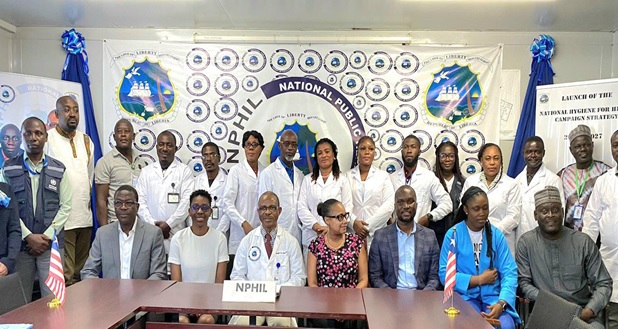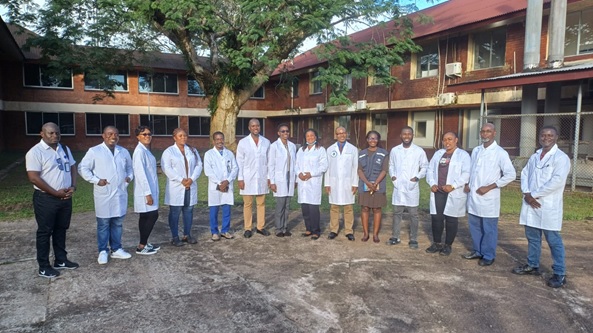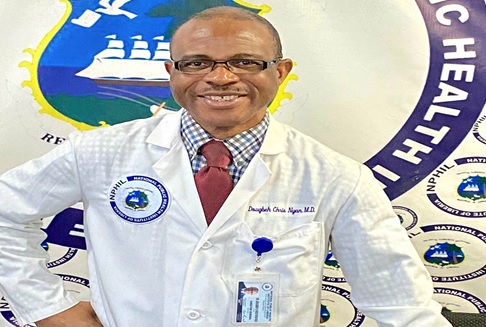MONROVIA – In a groundbreaking development for Liberia’s public health system, the National Public Health Institute of Liberia (NPHIL), under the leadership of Director-General Dr. Dougbeh Chris Nyan, has announced a significant milestone. For the first time, Liberian scientists have detected and identified the Monkeypox virus Clade IIb using genomic sequencing technology within the country. This achievement marks a major step forward in Liberia’s ability to respond rapidly to infectious disease outbreaks without relying on foreign laboratories.
Since the declaration of the global Mpox outbreak as a public health emergency by the World Health Organization (WHO) and the Africa Centers for Disease Control and Prevention (Africa CDC) in August 2024, Liberia has maintained robust surveillance. Dr. Nyan reported that as of Epidemiological Week 43, Liberia has recorded zero deaths, achieving a 0% case fatality rate (CFR). The country has reported 14 recoveries, with only eight active cases remaining.

“Acquiring full biomolecular sequencing capability now empowers Liberia’s National Reference Laboratory to promptly identify pathogen types, including viruses and bacteria, within the country,” Dr. Nyan explained. He elaborated that genomic sequencing is a specialized technique that maps the DNA, RNA, or protein structure of an organism, revealing potential genetic mutations and the origin of pathogens.
Previously, Liberia depended on facilities such as the US National Institutes of Health (NIH) and the Nigeria Center for Disease Control (NCDC) for genetic sequencing. These external analyses had confirmed the presence of the Clade-IIa virus in Liberia earlier this year. Now, with the recent detection of the Clade IIb variant locally, the country’s capability to conduct in-depth genetic analyses has been solidified, providing vital insights into virus transmission, whether animal-to-human or human-to-human.

“This technical advancement was made possible through the support of the WHO-Liberia Country Office and the expertise provided by the Noguchi Memorial Institute in Ghana,” Dr. Nyan said. “We appreciate the collaboration of the Africa CDC, US CDC, USAID, and other partners for their invaluable assistance.”
The impact of genomic sequencing goes beyond the current Monkeypox outbreak. This capability will benefit Liberia’s response to other public health challenges, including Lassa fever, measles, and rubella. The technology enables tailored approaches to diagnostics, vaccine development, and therapeutic interventions, strengthening Liberia’s health security framework.
In an interview with Smart News Liberia on Sunday, November 3, 2024, Dr. Nyan shared his reflections on the groundbreaking achievement of Liberian scientists using genomic sequencing technology to detect and identify the Monkeypox virus Clade IIb. Reflecting on the significant challenges faced during past outbreaks, Dr. Nyan stated, “Previously, we could only determine if a test result was positive or negative, but we couldn’t identify the specific pathogen type responsible or understand its genetic behavior. This is the first time, under my leadership since the institution’s founding, that we have been able to achieve such an in-depth analysis. This breakthrough now allows us to fully comprehend the genetic profile of a virus or bacteria and detect any potential mutations early on,” he noted. “Such detailed knowledge is essential for accurate diagnostics, the development of effective vaccines, and strategic public health responses that can adapt to emerging threats.”
NPHIL has also spearheaded training initiatives for epidemiological teams nationwide, ensuring they are equipped for effective outbreak response, sample collection, and sequencing. Supported by USAID, WHO, Africa CDC, and the U.S. CDC, these programs have reinforced Liberia’s preparedness.
Recently confirmed cases include two young children—a two-year-old and a one-month-old from Bong County—who contracted the virus from their mothers. Both women showed visible symptoms such as rashes and pustules. Dr. Nyan emphasized the importance of seeking medical care at the onset of symptoms to prevent transmission.
“Although Monkeypox can be self-limiting and managed by the body’s immune response, we advise individuals not to stay home if they suspect symptoms. Immediate medical attention is crucial to curb further spread,” he said.
Amid ongoing public health crises, including outbreaks of Lassa fever, measles, and rubella, Dr. Nyan urged the public to remain vigilant. He called for adherence to hygiene practices, prompt reporting of suspected cases, and the practice of safe sexual behavior to reduce transmission risks.
“The NPHIL, together with the National Incident Management System (IMS), is actively coordinating efforts with international partners to mobilize resources and contain the virus,” Dr. Nyan assured.
Liberia’s new genomic sequencing capability represents a transformative moment for the nation’s public health infrastructure, positioning the country to respond more effectively to current and future outbreaks. This milestone, achieved under the leadership and vision of Dr. Nyan, emphasizes Liberia’s resilience and commitment to safeguarding the health of its population.







